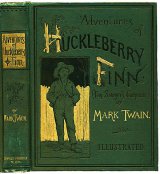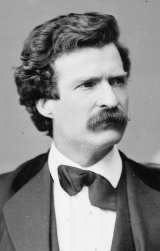Adventures of Huckleberry Finn Page #14
Adventures of Huckleberry Finn is a novel by Mark Twain, first published in the United Kingdom in December 1884 and in the United States in February 1885.
“So you lost the ten dollars.” “No, I didn't lose it all. I on'y los' 'bout nine of it. I sole de hide en taller for a dollar en ten cents.” “You had five dollars and ten cents left. Did you speculate any more?” “Yes. You know that one-laigged n*gger dat b'longs to old Misto Bradish? Well, he sot up a bank, en say anybody dat put in a dollar would git fo' dollars mo' at de en' er de year. Well, all de niggers went in, but dey didn't have much. I wuz de on'y one dat had much. So I stuck out for mo' dan fo' dollars, en I said 'f I didn' git it I'd start a bank mysef. Well, o' course dat n*gger want' to keep me out er de business, bekase he says dey warn't business 'nough for two banks, so he say I could put in my five dollars en he pay me thirty-five at de en' er de year. “So I done it. Den I reck'n'd I'd inves' de thirty-five dollars right off en keep things a-movin'. Dey wuz a n*gger name' Bob, dat had ketched a wood-flat, en his marster didn' know it; en I bought it off'n him en told him to take de thirty-five dollars when de en' er de year come; but somebody stole de wood-flat dat night, en nex day de one-laigged n*gger say de bank's busted. So dey didn' none uv us git no money.” “What did you do with the ten cents, Jim?” “Well, I 'uz gwyne to spen' it, but I had a dream, en de dream tole me to give it to a n*gger name' Balum--Balum's Ass dey call him for short; he's one er dem chuckleheads, you know. But he's lucky, dey say, en I see I warn't lucky. De dream say let Balum inves' de ten cents en he'd make a raise for me. Well, Balum he tuck de money, en when he wuz in church he hear de preacher say dat whoever give to de po' len' to de Lord, en boun' to git his money back a hund'd times. So Balum he tuck en give de ten cents to de po', en laid low to see what wuz gwyne to come of it.” “Well, what did come of it, Jim?” “Nuffn never come of it. I couldn' manage to k'leck dat money no way; en Balum he couldn'. I ain' gwyne to len' no mo' money 'dout I see de security. Boun' to git yo' money back a hund'd times, de preacher says! Ef I could git de ten cents back, I'd call it squah, en be glad er de chanst.” “Well, it's all right anyway, Jim, long as you're going to be rich again some time or other.” “Yes; en I's rich now, come to look at it. I owns mysef, en I's wuth eight hund'd dollars. I wisht I had de money, I wouldn' want no mo'.” CHAPTER IX. I wanted to go and look at a place right about the middle of the island that I'd found when I was exploring; so we started and soon got to it, because the island was only three miles long and a quarter of a mile wide. This place was a tolerable long, steep hill or ridge about forty foot high. We had a rough time getting to the top, the sides was so steep and the bushes so thick. We tramped and clumb around all over it, and by and by found a good big cavern in the rock, most up to the top on the side towards Illinois. The cavern was as big as two or three rooms bunched together, and Jim could stand up straight in it. It was cool in there. Jim was for putting our traps in there right away, but I said we didn't want to be climbing up and down there all the time. Jim said if we had the canoe hid in a good place, and had all the traps in the cavern, we could rush there if anybody was to come to the island, and they would never find us without dogs. And, besides, he said them little birds had said it was going to rain, and did I want the things to get wet? So we went back and got the canoe, and paddled up abreast the cavern, and lugged all the traps up there. Then we hunted up a place close by to hide the canoe in, amongst the thick willows. We took some fish off of the lines and set them again, and begun to get ready for dinner. The door of the cavern was big enough to roll a hogshead in, and on one side of the door the floor stuck out a little bit, and was flat and a good place to build a fire on. So we built it there and cooked dinner. We spread the blankets inside for a carpet, and eat our dinner in there. We put all the other things handy at the back of the cavern. Pretty soon it darkened up, and begun to thunder and lighten; so the birds was right about it. Directly it begun to rain, and it rained like all fury, too, and I never see the wind blow so. It was one of these regular summer storms. It would get so dark that it looked all blue-black outside, and lovely; and the rain would thrash along by so thick that the trees off a little ways looked dim and spider-webby; and here would come a blast of wind that would bend the trees down and turn up the pale underside of the leaves; and then a perfect ripper of a gust would follow along and set the branches to tossing their arms as if they was just wild; and next, when it was just about the bluest and blackest--FST! it was as bright as glory, and you'd have a little glimpse of tree-tops a-plunging about away off yonder in the storm, hundreds of yards further than you could see before; dark as sin again in a second, and now you'd hear the thunder let go with an awful crash, and then go rumbling, grumbling, tumbling, down the sky towards the under side of the world, like rolling empty barrels down stairs--where it's long stairs and they bounce a good deal, you know. “Jim, this is nice,” I says. “I wouldn't want to be nowhere else but here. Pass me along another hunk of fish and some hot corn-bread.” “Well, you wouldn't a ben here 'f it hadn't a ben for Jim. You'd a ben down dah in de woods widout any dinner, en gittn' mos' drownded, too; dat you would, honey. Chickens knows when it's gwyne to rain, en so do de birds, chile.” The river went on raising and raising for ten or twelve days, till at last it was over the banks. The water was three or four foot deep on the island in the low places and on the Illinois bottom. On that side it was a good many miles wide, but on the Missouri side it was the same old distance across--a half a mile--because the Missouri shore was just a wall of high bluffs. Daytimes we paddled all over the island in the canoe, It was mighty cool and shady in the deep woods, even if the sun was blazing outside. We went winding in and out amongst the trees, and sometimes the vines hung so thick we had to back away and go some other way. Well, on every old broken-down tree you could see rabbits and snakes and such things; and when the island had been overflowed a day or two they got so tame, on account of being hungry, that you could paddle right up and put your hand on them if you wanted to; but not the snakes and turtles--they would slide off in the water. The ridge our cavern was in was full of them. We could a had pets enough if we'd wanted them. One night we catched a little section of a lumber raft--nice pine planks. It was twelve foot wide and about fifteen or sixteen foot long, and the top stood above water six or seven inches--a solid, level floor. We could see saw-logs go by in the daylight sometimes, but we let them go; we didn't show ourselves in daylight.
Translation
Translate and read this book in other languages:
Select another language:
- - Select -
- 简体中文 (Chinese - Simplified)
- 繁體中文 (Chinese - Traditional)
- Español (Spanish)
- Esperanto (Esperanto)
- 日本語 (Japanese)
- Português (Portuguese)
- Deutsch (German)
- العربية (Arabic)
- Français (French)
- Русский (Russian)
- ಕನ್ನಡ (Kannada)
- 한국어 (Korean)
- עברית (Hebrew)
- Gaeilge (Irish)
- Українська (Ukrainian)
- اردو (Urdu)
- Magyar (Hungarian)
- मानक हिन्दी (Hindi)
- Indonesia (Indonesian)
- Italiano (Italian)
- தமிழ் (Tamil)
- Türkçe (Turkish)
- తెలుగు (Telugu)
- ภาษาไทย (Thai)
- Tiếng Việt (Vietnamese)
- Čeština (Czech)
- Polski (Polish)
- Bahasa Indonesia (Indonesian)
- Românește (Romanian)
- Nederlands (Dutch)
- Ελληνικά (Greek)
- Latinum (Latin)
- Svenska (Swedish)
- Dansk (Danish)
- Suomi (Finnish)
- فارسی (Persian)
- ייִדיש (Yiddish)
- հայերեն (Armenian)
- Norsk (Norwegian)
- English (English)
Citation
Use the citation below to add this book to your bibliography:
Style:MLAChicagoAPA
"Adventures of Huckleberry Finn Books." Literature.com. STANDS4 LLC, 2024. Web. 25 Dec. 2024. <https://www.literature.com/book/adventures_of_huckleberry_finn_35>.




Discuss this Adventures of Huckleberry Finn book with the community:
Report Comment
We're doing our best to make sure our content is useful, accurate and safe.
If by any chance you spot an inappropriate comment while navigating through our website please use this form to let us know, and we'll take care of it shortly.
Attachment
You need to be logged in to favorite.
Log In